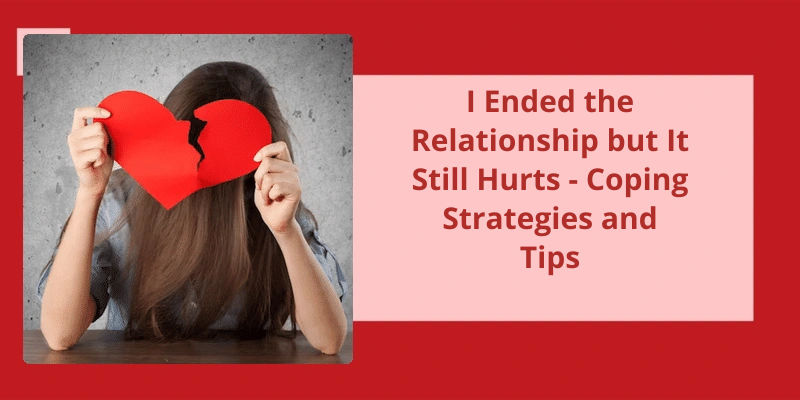The end of a relationship can be a particularly challenging time for individuals, as it marks a significant change in one's life. While some breakups can be amicable, others may be contentious and emotionally difficult to navigate. Regardless of the circumstances surrounding the end of the relationship, it's natural to feel a sense of grief and loss. Even if you were the one who initiated the breakup, it can still be incredibly painful to let go of someone you once cared deeply for. In this article, we will explore ways to cope with the emotional aftermath of a breakup, and provide insights and strategies for navigating the road to healing.
Why Does It Hurt When I Ended the Relationship?
This is why those who’ve recently ended a relationship may experience feelings of obsessive thinking, withdrawal symptoms, and intense emotional pain. The study suggests that these symptoms are similar to those experienced by drug addicts when they stop using their drugs of choice.
Furthermore, ending a relationship can also lead to a loss of identity and direction. Often, people define themselves by their relationships and when that’s taken away, they can feel lost and unsure of who they’re as individuals. This can cause a sense of confusion and a lack of purpose which can be difficult to overcome.
In addition to this, the fear of being alone can cause intense sadness and anxiety. Many people rely on their romantic partners for emotional support and when that’s no longer available, they may feel isolated and alone. This can also lead to feelings of depression which can make moving on even harder.
Another factor that can contribute to the pain of a breakup is the loss of trust. Trust is a crucial component of any healthy relationship and when it’s broken, it can be difficult to repair. The betrayal and hurt that comes with a broken trust can cause long-lasting emotional pain that can take a toll on ones mental health.
Finally, the end of a relationship can also trigger feelings of rejection. Rejection is a painful experience that can make people question their self-worth and value. The pain of rejection can be difficult to overcome and can lead to feelings of anger, sadness, and despair.
Coping Mechanisms and Strategies for Dealing With the Pain of a Breakup
This article discusses helpful coping mechanisms and strategies to deal with the pain of a breakup. It covers techniques such as talking to a therapist, embracing self-care, reaching out to supportive friends and family, finding healthy distractions, and taking time for reflection and personal growth. These practices can help individuals navigate the difficult emotions that come with the end of a relationship and find a path towards healing and moving forward.
The aftermath of a breakup can be a painful and confusing time, especially when the hurt seems to linger long after the relationship has ended. Many people wonder why they can’t seem to move on, despite their best efforts to do so. While there are many factors that can contribute to this phenomenon, one of the most common reasons is how we see ourselves in the wake of a breakup. When we attach our sense of self-worth to the success or failure of a relationship, it can be hard to let go of the hurt and move forward with confidence. In the following sections, we’ll explore some of the key ways that our self-concept impacts our ability to heal and grow after a breakup.
Why Am I Still Hurting After a Breakup?
Perhaps you see yourself as unlovable, unworthy, or inadequate in some way. This negative self-perception can be crippling, leading you to replay the breakup in your mind and wonder what you could have done differently to save the relationship. Ruminating on these thoughts only reinforces the belief that you’re flawed and unlovable, perpetuating your pain and preventing you from moving on.
Another reason why you may still be hurting after a breakup is that you havent fully processed your emotions. Emotions are complex, and it’s natural for them to ebb and flow over time. However, if you never allowed yourself to fully feel the pain and sadness of the breakup, or if you suppressed your emotions altogether, they may still be simmering beneath the surface, waiting to be addressed. This can manifest in unexpected ways – perhaps you cant seem to get excited about dating again, or you find yourself crying at random moments when youre alone.
Holding onto anger and resentment towards your ex-partner can also contribute to ongoing pain after a breakup. Whether it was a messy, tumultuous split or simply the disappointment of a relationship that didnt work out, it’s easy to feel resentful towards the person who hurt you. However, hanging onto these negative feelings can keep you trapped in the past, preventing you from moving beyond the breakup and finding new happiness.
External factors, such as a lack of social support or a difficult living situation, can also prolong the pain of a breakup. If you don’t have close friends or family members you can lean on during a difficult time, it can be even harder to process your emotions and move forward. Similarly, if you’re forced to continue interacting with your ex-partner on a regular basis, whether because you work together or share custody of children, it can be challenging to create healthy boundaries and avoid falling back into old patterns.
Finally, it’s important to understand that healing from a breakup isn’t a linear, one-size-fits-all process. Everyone experiences heartbreak in their own way, and there’s no “right” amount of time it should take to move on. Instead of comparing yourself to others or trying to rush the process, focus on taking care of yourself and seeking support when you need it. This might mean seeking therapy, finding new hobbies that bring you joy, or simply giving yourself permission to grieve.
The Role of Attachment Styles in Post-Breakup Pain and How to Identify and Work on Your Own Attachment Style.
- The importance of attachment styles in post-breakup pain
- Understanding how your attachment style affects your relationships and breakup experiences
- Types of attachment styles (avoidant, anxious, secure) and characteristics of each
- Ways to identify your own attachment style through self-reflection and therapy
- How to work on and improve your attachment style through therapy, self-help techniques, and mindfulness practices
- Benefits of identifying and improving your attachment style for future relationships and overall emotional wellbeing
The emotional pain following a breakup can be overwhelming, and a new study sheds light on which part of a breakup hurts the most. According to researchers at Cornell University, comparative rejection – being dumped for someone else – is the most hurtful type of breakup. In this article, we’ll explore the study and what it means for those going through a breakup.
What Part of the Breakup Hurts the Most?
Few things in life are as emotionally devastating as going through a breakup, especially when the end of a relationship takes us by surprise. However, not all breakups are created equal, and according to a recent study, the most hurtful type of separation is one that involves your partner leaving you for somebody else. Known as “comparative rejection,” this type of breakup can be particularly painful, as it involves the added indignity of feeling like you weren’t good enough for your partner.
As one might expect, the study found that feeling pain and distress was a universal experience following a breakup, but comparative rejection stood out as the most hurtful type. This is due to a variety of factors, including decreased self-worth, feelings of betrayal or rejection, and a heightened sense of vulnerability. All of these factors contribute to the intense emotional distress that follows a comparative rejection and can make it difficult to move on.
Indeed, the study found that individuals who were dumped for someone else were often left with feelings of hopelessness and inadequacy, which could have a profound impact on their ability to form new relationships. This kind of breakup can also lead to feelings of anger and resentment towards the ex-partner, which can further complicate the healing process. It’s essential to recognize and acknowledge these feelings in order to move forward and begin the healing process.
Interestingly, the study found that who initiated the breakup was also a significant factor in determining the level of distress experienced by the rejected party. People who were rejected were found to feel less in control of the situation, leading to greater emotional turmoil. On the other hand, individuals who ended the relationship had a greater sense of control and autonomy, which may have helped to mitigate any negative feelings.
Breakups are never easy, but some are more painful than others. The key to healing is acknowledging these emotions and working through them in a healthy and constructive way. With time, self-care, and support from loved ones, it’s possible to recover and move forward from a comparative rejection.
Coping Mechanisms for Dealing With Comparative Rejection After a Breakup.
- Engage in physical activity such as exercise or outdoor activities
- Seek emotional support from close friends or family members
- Express your feelings through writing or other creative outlets
- Practice mindfulness and meditation
- Set realistic and achievable goals for yourself
- Try new hobbies or activities to keep your mind occupied
- Consider seeking counseling or therapy to work through the rejection
- Take time for self-care and prioritize your emotional wellbeing
- Focus on self-improvement and personal growth
- Avoid excessive alcohol or drug use as a coping mechanism
Source: Science Knows Exactly What Type Of Breakup Hurts Most
Conclusion
However, it's important to remember that healing isn’t a linear path and everyone has their own timeline. It's okay to take the time you need to grieve and process your emotions. It's also important to practice self-care and seek support from friends and family or even a professional if needed. Remember, the pain will eventually fade and healing is possible. Moving on from a past relationship is never easy, but it's a necessary part of growth and a new beginning.






